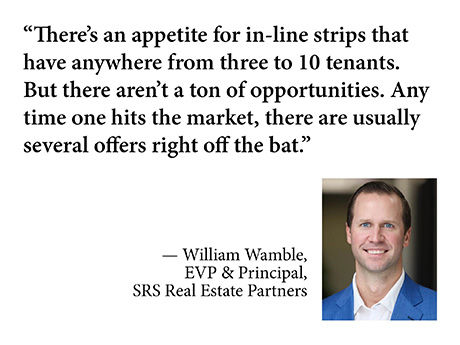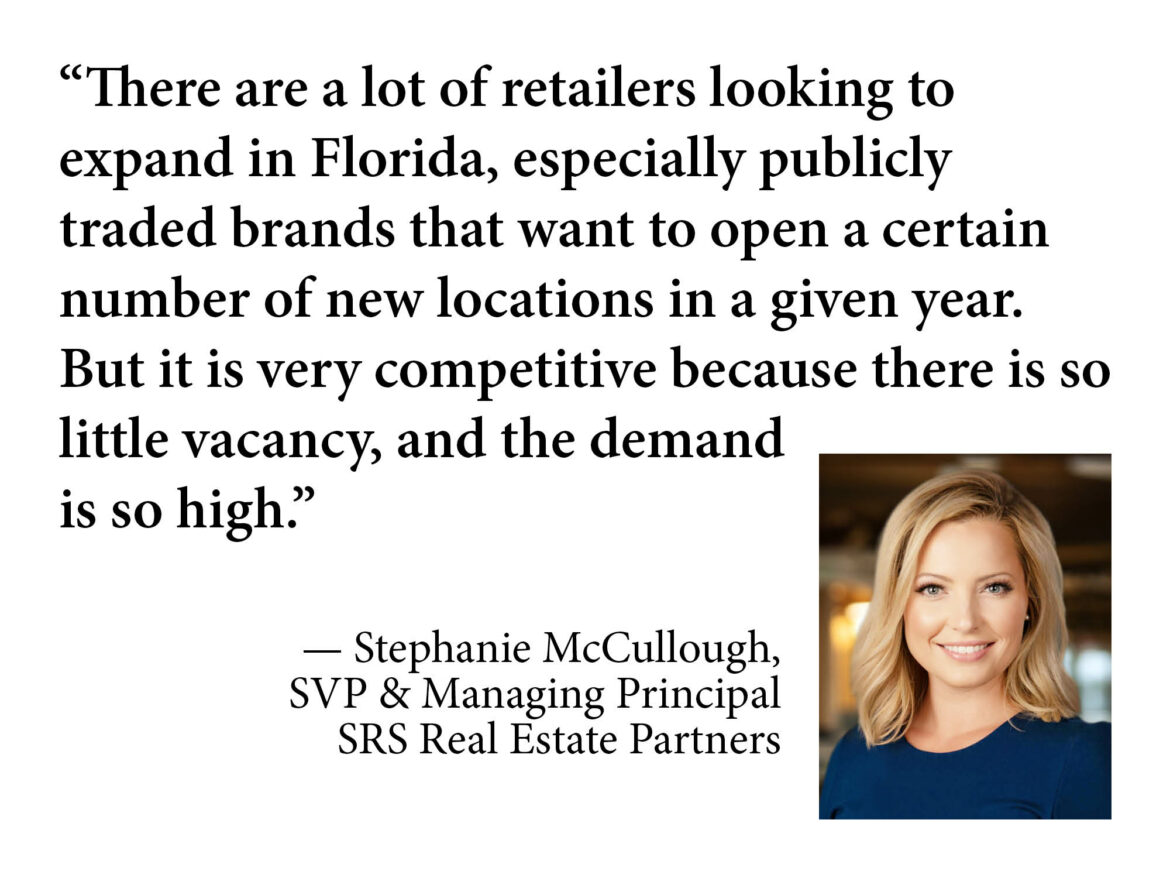Florida’s nation-leading population growth and its pro-business reputation continue to underpin retail investment and expansion activity. Vacancy rates in the state’s major metros range from 3.1 percent in Miami to 4.6 percent in Jacksonville, all well below their historical averages, according to CoStar. Investment sales in the markets during the first half of 2025 totaled around $2.5 billion, and each market except for Orlando saw an increase in year-over-year sales, CoStar reports.
“Whether it’s buyers of retail properties or retailers looking to open up new locations, they’re all descending on Florida,” says William Wamble, an executive vice president and principal with SRS Real Estate Partners in Tampa, who specializes in advisory and sales of net leased properties nationwide. “If you look at population trends across any metro in Florida, they’re likely going to be positive. Every large homebuilder in the country seems to be active across our suburban markets.”

Indeed, according to a study conducted by online mortgage marketplace LendingTree, five of the nation’s fastest-growing cities from 2021 through 2023 were in Florida, one of nine states in the U.S. that doesn’t tax personal income.
Meanwhile, its business-friendly credentials include a new law that is expected to generate $2.5 billion in operational savings by eliminating sales tax on commercial leases. That should help blunt one headwind in the state: rising insurance premiums due to hurricane losses.
“The savings may not be exactly equivalent to the insurance increases,” says Stephanie McCullough, a senior vice president and managing principal with SRS Real Estate, who leads the tenant and owner services business in northern Florida. “But retailers will certainly see a benefit.”
SRS Real Estate will explore these Florida-specific topics and more at the upcoming ICSC@Florida conference, August 25-26. Visit them at booth 2905 in the Orange County Convention Center.
Net Lease Demand
From an investment perspective, Florida’s growth dynamics are helping to drive aggressive pricing for net lease properties in Florida, notes Wamble. He has compared the sales of various net lease properties with the same operator, size and lease traits across several U.S. markets, and his findings suggest that buyers in Florida are paying a capitalization rate premium of 10 to 50 basis points (sometimes even higher) versus other parts of the country. That’s especially true among 1031 exchange investors who are looking to deploy proceeds from apartment, industrial or office sales.
In July, Wamble and other SRS Real Estate professionals represented a national investment and development firm in the sale of a new 950-square-foot Dutch Bros Coffee in suburban Orlando to a 1031 exchange buyer for $3.13 million. It was also the second Dutch Bros in Florida that the team had sold at a sub-5 percent cap rate in the last year, according to Wamble.
“We’re attracting investors from throughout the country who want to come to Florida, many of whom are looking to retire,” he points out.
While investment demand for multi-tenant properties isn’t as brisk as it is for net lease opportunities, interest is growing for new unanchored strip centers coming to market, Wamble says. His team has facilitated the sale of over 20 newly developed retail strips worth over $120 million of consideration since the beginning of 2024. Most recently, he was involved in the July 2025 sale of Soho Roundlake, a newly developed five-tenant strip in St.Petersburg. The price of $7.2 million represented a cap rate of 6.00 percent.
“There’s an appetite for in-line strips that have anywhere from three to 10 tenants,” he adds. “But there aren’t a ton of opportunities. Any time one hits the market, there are usually several offers right off the bat.”
The Hunt for Availability
Unanchored strip centers are also generating demand among tenants, says McCullough, who is based in SRS Real Estate’s Jacksonville office. Like other parts of the country, shopping center owners in Florida typically have the upper hand when negotiating with new tenants amid a dearth of availability in quality properties, she explains, and leasing in-line retail space in a grocery center typically carries a premium due to the anchor’s pull.
Alternatively, well-positioned unanchored strip centers or those in the shadow of an anchor are becoming more attractive to tenants able to lease space at less of a premium, McCullough notes. Still, those assets serve only a sliver of the retailers combing the market for expansion opportunities. Large-scale grocers, fitness brands, medical providers, wellness concepts and quick-service restaurants are among the most active retailers in the market, McCullough states.
“There are a lot of retailers looking to expand in Florida, especially publicly traded brands that want to open a certain number of new locations in a given year,” she says. “But it is very competitive because there is so little vacancy, and the demand is so high.”
In some cases, landlords are getting a jump on backfilling space occupied by tenants who are expected to close, McCullough reports. Not only do such situations create a path to availability, but they also provide landlords with the ability to substantially ramp up rents over in-place rents that were negotiated years before, she adds.
“There are tenants who are struggling across the board, and it’s creating opportunities for landlords and expanding tenants alike,” McCullough says. “A lot of deals we’re doing now are for sites that aren’t on the market.”
— By Joe Gose. This article was written in conjunction with SRS Real Estate Partners, a content partner of Shopping Center Business.


